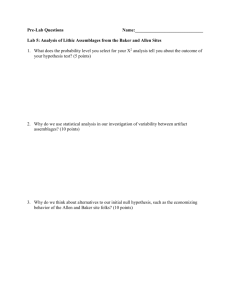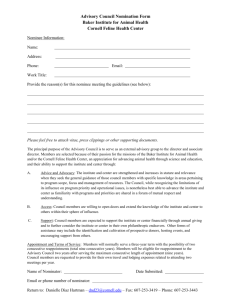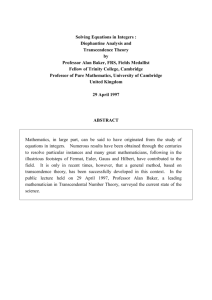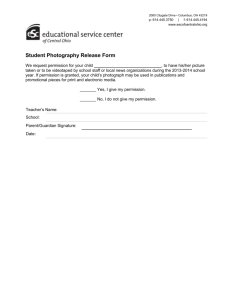Chem 2080, CourseInfo 2012.mwd - Department of Chemistry and
advertisement
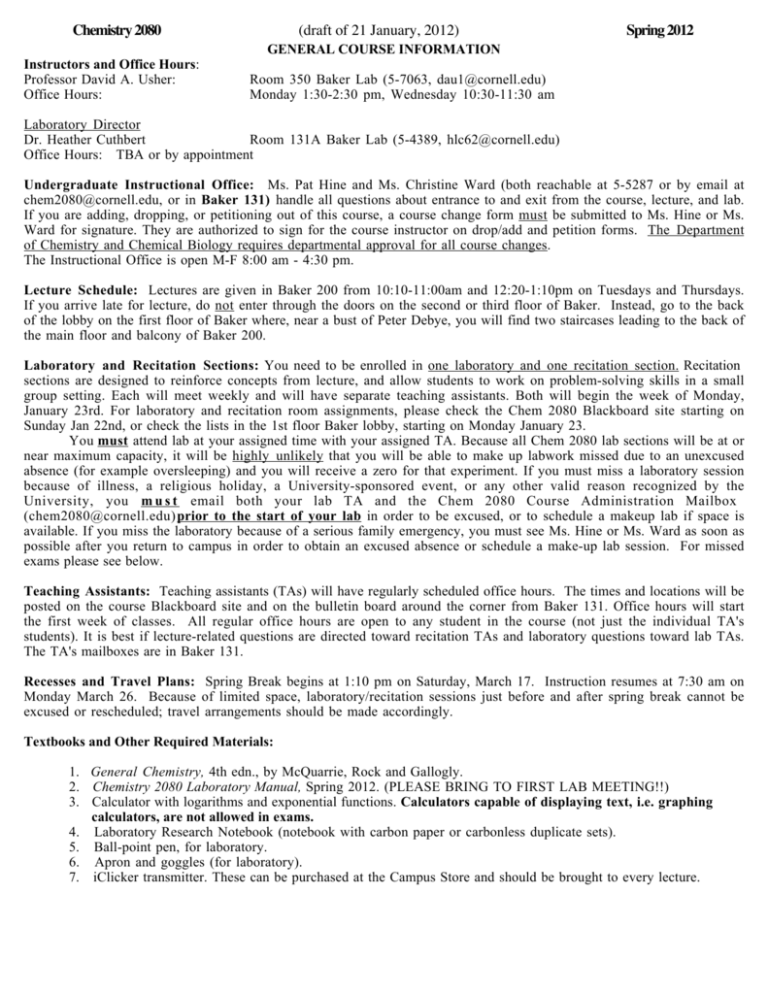
Chemistry 2080 Instructors and Office Hours: Professor David A. Usher: Office Hours: (draft of 21 January, 2012) Spring 2012 GENERAL COURSE INFORMATION Room 350 Baker Lab (5-7063, dau1@cornell.edu) Monday 1:30-2:30 pm, Wednesday 10:30-11:30 am Laboratory Director Dr. Heather Cuthbert Room 131A Baker Lab (5-4389, hlc62@cornell.edu) Office Hours: TBA or by appointment Undergraduate Instructional Office: Ms. Pat Hine and Ms. Christine Ward (both reachable at 5-5287 or by email at chem2080@cornell.edu, or in Baker 131) handle all questions about entrance to and exit from the course, lecture, and lab. If you are adding, dropping, or petitioning out of this course, a course change form must be submitted to Ms. Hine or Ms. Ward for signature. They are authorized to sign for the course instructor on drop/add and petition forms. The Department of Chemistry and Chemical Biology requires departmental approval for all course changes. The Instructional Office is open M-F 8:00 am - 4:30 pm. Lecture Schedule: Lectures are given in Baker 200 from 10:10-11:00am and 12:20-1:10pm on Tuesdays and Thursdays. If you arrive late for lecture, do not enter through the doors on the second or third floor of Baker. Instead, go to the back of the lobby on the first floor of Baker where, near a bust of Peter Debye, you will find two staircases leading to the back of the main floor and balcony of Baker 200. Laboratory and Recitation Sections: You need to be enrolled in one laboratory and one recitation section. Recitation sections are designed to reinforce concepts from lecture, and allow students to work on problem-solving skills in a small group setting. Each will meet weekly and will have separate teaching assistants. Both will begin the week of Monday, January 23rd. For laboratory and recitation room assignments, please check the Chem 2080 Blackboard site starting on Sunday Jan 22nd, or check the lists in the 1st floor Baker lobby, starting on Monday January 23. You must attend lab at your assigned time with your assigned TA. Because all Chem 2080 lab sections will be at or near maximum capacity, it will be highly unlikely that you will be able to make up labwork missed due to an unexcused absence (for example oversleeping) and you will receive a zero for that experiment. If you must miss a laboratory session because of illness, a religious holiday, a University-sponsored event, or any other valid reason recognized by the University, you m u s t email both your lab TA and the Chem 2080 Course Administration Mailbox (chem2080@cornell.edu) prior to the start of your lab in order to be excused, or to schedule a makeup lab if space is available. If you miss the laboratory because of a serious family emergency, you must see Ms. Hine or Ms. Ward as soon as possible after you return to campus in order to obtain an excused absence or schedule a make-up lab session. For missed exams please see below. Teaching Assistants: Teaching assistants (TAs) will have regularly scheduled office hours. The times and locations will be posted on the course Blackboard site and on the bulletin board around the corner from Baker 131. Office hours will start the first week of classes. All regular office hours are open to any student in the course (not just the individual TA's students). It is best if lecture-related questions are directed toward recitation TAs and laboratory questions toward lab TAs. The TA's mailboxes are in Baker 131. Recesses and Travel Plans: Spring Break begins at 1:10 pm on Saturday, March 17. Instruction resumes at 7:30 am on Monday March 26. Because of limited space, laboratory/recitation sessions just before and after spring break cannot be excused or rescheduled; travel arrangements should be made accordingly. Textbooks and Other Required Materials: 1. General Chemistry, 4th edn., by McQuarrie, Rock and Gallogly. 2. Chemistry 2080 Laboratory Manual, Spring 2012. (PLEASE BRING TO FIRST LAB MEETING!!) 3. Calculator with logarithms and exponential functions. Calculators capable of displaying text, i.e. graphing calculators, are not allowed in exams. 4. Laboratory Research Notebook (notebook with carbon paper or carbonless duplicate sets). 5. Ball-point pen, for laboratory. 6. Apron and goggles (for laboratory). 7. iClicker transmitter. These can be purchased at the Campus Store and should be brought to every lecture. Chemistry 2080 (draft of 21 January, 2012) Spring 2012 Chemistry 1008: The Learning Strategies Center offers Chemistry 1008 (one credit hour, S/U) to help students better understand the concepts presented in the course and improve performance. Chemistry 1008 will be taught by Dr. Steve Johnson (skj29@cornell.edu), and will meet on Mondays 7:30-9:00 pm in Baker 219, on Tuesdays 1:25-2:55 pm in Baker 119 and on Thursdays 8:15-9:45 am in Baker 335. All Chem 2080 students are welcome to attend, regardless of registration. Chem 1008 tutors will be holding office hours in Baker 157 from 12:00 to 9:00 pm Sunday-Thursday, and 12:00 to 2:00 pm on Fridays. Problem-solving sessions will be Thursdays from 1:25-2:15 pm in Baker 335 and Fridays from 2:25-3:15 pm in Baker 135. For more information, visit the Chem 1008 website at http://www.blackboard.cornell.edu. Evacuation from Baker 200: Students sitting in the front part of Baker 200 (a dividing line is on the wall) should exit out the front doors, down the stairs, and out the front doors of Baker Lab. Proceed away from the building; many other students from other classes will be behind you. Students in the back of Baker 200 and on the balcony go down the stairs at the back of the room, then outside into the courtyard. Go left and follow the pathway back into the building. Turn right, following the sign, and walk down the hallway to the exit between Baker and ST Olin Lab. Homework Problem Sets: Each Thursday, by 5 pm, TWO new sets of problems will be posted on the Chem 2080 Blackboard site. One of the two sets will consist of problems that you should work and hand in for grading. The other set will consist of additional problems that come straight from the McQuarrie et al textbook. The latter will not be handed in, but to encourage you to do them, one question on each prelim, and two questions on the final exam will come directly from these sets. Verbatim! Answers to these McQuarrie problems will be posted on the Blackboard site at the same time as the problems are posted, but as a separate file. (Duh). Regarding the other set of problems, i.e. the ones that are handed in for grading, the deadline will be 2 pm on the Friday in the following week (i.e., 8 days after being assigned). Put your answers in the correct metal box in Baker Lobby that has your lab TA's name on it. Late assignments will not be accepted. Solutions will be posted on the Chem 2080 Blackboard site on Fridays at 2:00 p.m. The problem sets will serve as the foundation for your weekly recitation section, and provide practice for the exams. Students can work together, but everyone must hand in their own assignments. Examinations: Two preliminary examinations will be held from 7:30-9:00 pm on Tue, February 28th and Tue, April 10th.. The final exam will be 7:00-9:30 pm on Thu, May 10th.. If you have a conflict with another University-scheduled examination contact Ms. Hine or Ms. Ward as soon as possible. Early exams will be scheduled if such conflicts occur, but no make-up exams will be given, and no excused absences will be issued to accommodate travel plans. Course Web Site: The Chem 2080 Web site can be accessed through http://www.blackboard.cornell.edu. Useful information posted here includes required prelaboratory questions, Material Safety Data Sheets (MSDS), problems, solutions for exams and homework sets, and lecture notes taken by a recitation TA. To access the course website you need to provide your NetID and password. Then follow instructions for self-enrolling in the Chem 2080 course website. Email: The administrative email address for this course is chem2080@cornell.edu. Please limit your use of this address to administrative matters. Routine questions on homework or course material are most effectively answered in person, during office hours, by a TA or by the professor. Academic Integrity: Each student in this course is expected to abide by the Cornell University Code of Academic Integrity: http://cuinfo.cornell.edu/Academic/AIC.html All work submitted by a student in this course for academic credit must be the student's own work. See the Chem 2080 Lab Handbook for further discussion of this. Course Topics: We will cover most of the material from the following chapters in McQuarrie et al, in the order given: 14 (Thermochemistry); 17 and 18 (Kinetics); 19 (Equilibrium); 20 (Acids and Bases); 21 (Buffers and the Titration of Acids and Bases); 22 (Solubility and Precipitation Reactions); 23 (Chemical Thermodynamics); 25 (Electrochemistry). Grading: The course will be graded on the basis of 1000 total points divided as shown below: Homework 100 Laboratory Reports 225 TA Evaluation 25 Examinations (2 at 175 points each) 350 Final Examination!!!!!!!!!!!!!!!!!!!!!!!!!!!!!!!!!!!!!!!!!!!!!!!!!!!!!!!!!!!!!!!!!!!!300 Total 1000 Chem 2080 – Schedule of Experiments, Spring 2012 Week Dates Experiment 1 1/23 – 1/27 Check-In & Safety 2 1/30 – 2/3 E1 – Hot/Coldpacks (begin) 3 2/6 – 2/10 E1 – Hot/Coldpacks (complete) 4 2/13 – 2/17 E2 – Kinetics: I2 Clock Rxn (begin) 5 2/20 – 2/24 E2 – Kinetics: I2 Clock Rxn (complete) 6 2/27 – 3/2 E3 – Chemical Equilibrium 7 3/5 – 3/9 E4 – Unknown Acid ID (begin) 8 3/12 – 3/16 9 3/19 – 3/23 10 3/26 – 3/30 11 4/2 – 4/6 E5 – Unknown Indicator pKa (complete) 12 4/9 – 4/13 E6 – Preparation of a Buffer Solution 13 4/16 – 4/20 E7 – Entropy of Solution 14 4/23 – 4/27 E8 – Electrochemical Cells 15 4/30 – 5/4 Check-Out E4 – Unknown Acid ID (complete) Spring Break E5 – Unknown Indicator pKa (begin) Additional Laboratory Information/Policies… 1. Pre-laboratory questions will be posted on the Chem 2080 Blackboard site on Thursday of the week before a new experiment begins. 2. Answers to pre-laboratory questions are due at the beginning of your lab period. 3. Copies of your lab notebook pages are due at the end of each lab period. 4. Lab reports are due at the beginning of the lab period one week following the date the experiment was completed. 5. Each lab experiment is graded out of 32 points. 6. All experiment scores count toward your final grade: your lowest score is NOT dropped. 7. You can submit one lab report one day late during the semester without penalty. After this instance, lab reports are penalized 5 points per day late.



